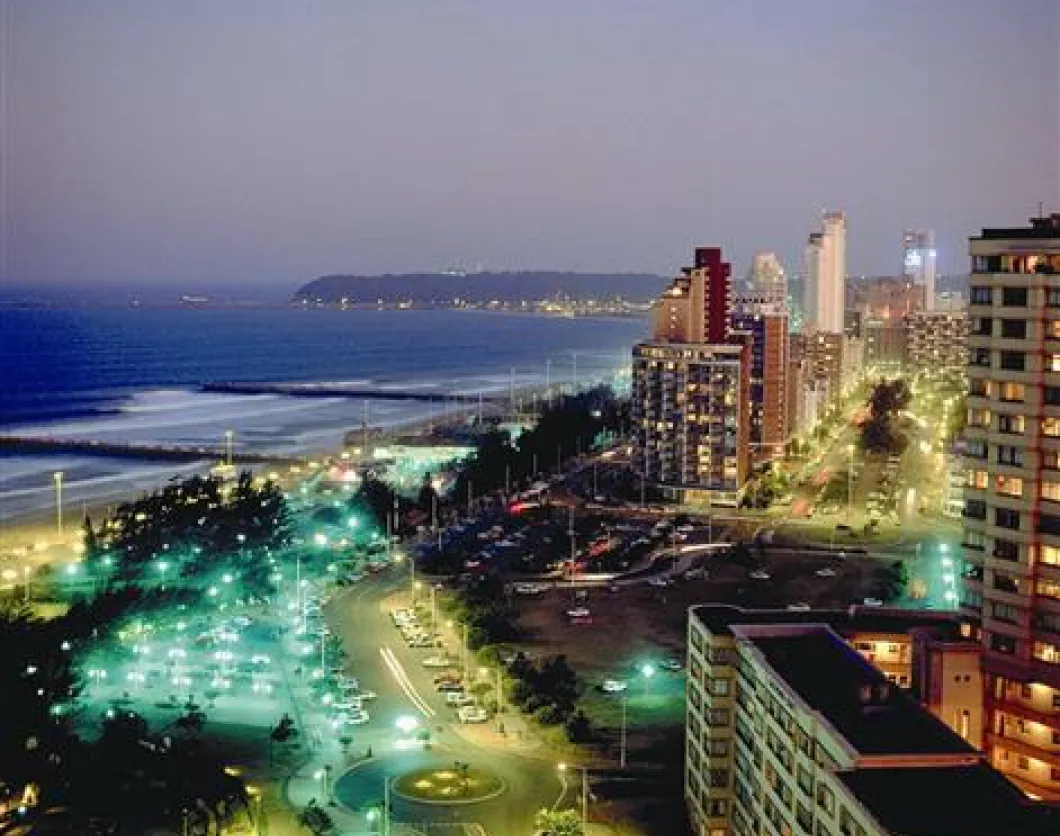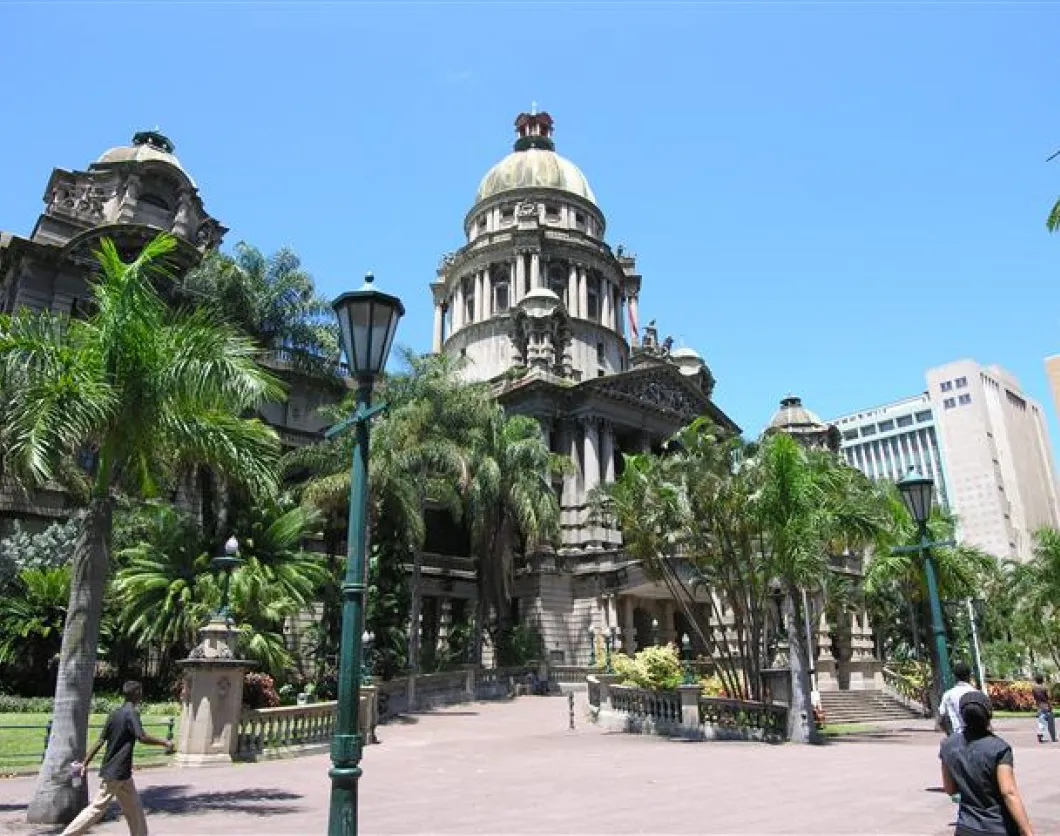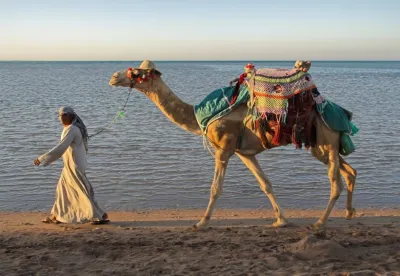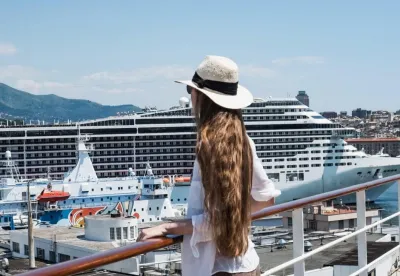Durban is the "girl next door' of South African cities – laid-back, fun, pretty and bursting with character. Situated on South Africa's eastern seaboard bordering the Indian Ocean, in the province of KwaZulu-Natal, Durban's year round summer climate makes it the ideal place to visit, especially if sun-drenched beaches and outdoor activities are what you're after.
Durban – and KwaZulu-Natal – has one of the richest cultural heritages in South Africa, and is a melting pot of African, Eastern and Western influences. It is home to the Zulu nation, famously united by Shaka Zulu in the early 1800s, and was settled at the same time by the British and Boers from the Cape. Indentured labourers from India were brought in to work the sugar plantations in the 1860s, and traders, merchants and religious leaders followed them from the East. The result is the cultural and religious mix unique to Durban.
Durban is most famous for its beaches which extend along the eastern edge of the city, collectively known as the Golden Mile. The wide beaches give ample space for bathers to soak up some rays, and the shark nets and professional lifeguards at every beach – as well as the fun waves – make swimming at Durban's beaches a favourite pastime. Durban is also known as "Surf City', thanks to its clean swell and hollow beach-breaks, which are ideal for experienced surfers, as well as those just learning to stand up on a board.
At the southern end of the Golden Mile is uShaka Marine World, the largest marine theme park in Africa and one of the five largest aquariums in the world. Built into the recreation of a 1920s cargo shipwreck, it includes 500 metres of viewing tanks and exhibits. The park is also home to a 1200-seater "dolphinarium', dive tank, tropical snorkel reef and one of the largest collections of sharks in the southern hemisphere. uShaka Wet "n Wild caters for kids and parents alike, from fun, hair-raising water slides to a relaxing 450m river ride, and sun-bathing areas. uShaka Village Walk offers some of Durban's best boutique shopping, not to mention fine dining at a number of fantastic restaurants.
Aliwal Shoal is a rocky reef just a 30-minute drive south of Durban and five kilometres offshore. Four kilometres in length, this is Durban's prime diving destination, where novice and experienced divers come to enjoy the range of gullies, overhangs and caves, ranging in depth from 5 to 35 metres. The reef is home to a wide variety of marine life, ranging from the tiny, brightly coloured nudibranchs to tropical fish and turtles, not to mention an array of hard and soft corals. The reef is especially well known for its abundance of fearsome looking Grey Nurse sharks, known locally as Ragged Tooth sharks or "raggies', which congregate here to mate between August and November. Two wrecks lying near the shoal, a bulk carrier called the "Produce', which sank in 1974, and the “Nebo”, which sank in 1884, are excellent and challenging wrecks for more experienced divers.
Those who prefer staying dry, and have more of an intellectual interest in the ocean can keep an eye out for the schools of Bottlenose dolphins which move up and down the coast all year round, frolicking in the waves and breaching in the water just behind backline. Between July and November each year, Humpback and Southern Right whales join them, and can be spotted easily from high points along the coast. A number of operators also offer the opportunity to go out to sea on small boats to get close to these enormous and gentle creatures.
If you head 30 minutes inland from the ocean you'll come across the Valley of a Thousand Hills, a land of literally thousands of hills dotted with traditional homesteads and grazing livestock, tumbling down to the Umgeni River. The area combines laidback country living on the doorstep of indigenous culture. The area has been home to the Zulu people for centuries, and it's here that many of them continue to live and practice their traditional lifestyle. You can experience their way of life through a visit to one of the Zulu cultural villages, where you'll be treated to traditional dancing, enter a practicing sangoma or traditional healer's hut and taste umqombothi, an African beer made from maize.
History buffs and culture fundis are encouraged to follow the Inanda Heritage Trail, which visits some of Durban's most important historical sites. Mahatma Gandhi, an icon of peace the world over, lived in the Phoenix Settlement north of Durban, and his home has been turned into a monument. From there you can head to the Ohlange Institute in Inanda Township, where Nelson Mandela cast his historic vote in South Africa's first democratic elections. Also worth a visit is the Jumma Musjid Mosque in downtown Durban, the largest in the southern hemisphere.









